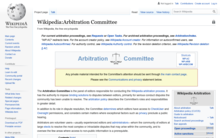
Back Arbitration Committee German Komite Arbitrasi (Wikipedia) ID 중재위원회 Korean Jawatankuasa Penimbangtaraan Malay Арбитражный комитет Russian Wikipedia Arbitration Committee SIMPLE คณะอนุญาโตตุลาการ (วิกิพีเดียภาษาอังกฤษ) Thai Арбітражний комітет Ukrainian Arbitraj qoʻmitasi Uzbek 仲裁委员会 (英语维基百科) Chinese
 Screenshot of the English Wikipedia Arbitration Committee main page in 2021 | |
| Abbreviation | Arbcom |
|---|---|
| Formation | December 4, 2003[1] |
Membership | 15 as of January 1, 2024[update] |
| Website | en |
On Wikimedia Foundation projects, an Arbitration Committee (ArbCom) is a binding dispute resolution panel of editors. Each of Wikimedia's projects are editorially autonomous and independent, and some of them have established their own ArbComs who work according to rules developed by the project's editors and are usually annually elected by their communities. ArbComs generally address misconduct by administrators and editors with access to advanced tools, and a range of "real-world" issues related to harmful conduct that can arise in the context of Wikimedia projects.[2][3] Rulings, policies and procedures differ between projects depending on local and cultural contexts. According to the Wikimedia Terms of Use, users are not obliged to have a dispute solved by an ArbCom.[4]
The first Wikimedia project to use an arbitration committee was the Swedish Wikipedia, soon followed by the widely covered English Wikipedia Committee. Over time, other Wikimedia projects have established Arbitration Committees as well.
The English Wikipedia ArbCom was created by Jimmy Wales on December 4, 2003, as an extension of the decision-making power he formerly held as CEO of site-owner Bomis.[1][5] Wales appointed members of the committee either in person or by email following advisory elections; Wales generally appointed editors who received the most votes to the ArbCom.[6][needs update]
The English Wikipedia's ArbCom acts as a court of last resort for disputes among editors and has been described in the media as "quasi-judicial" and a Wikipedian "High or Supreme Court", although the Committee states it is not and does not pretend to be a formal court of law. English Wikipedia's ArbCom has decided several hundred cases in its history.[7] The Foundation's Arbitration Committee process has been examined by academics researching dispute resolution, and has been reported in public media in connection with case decisions and Wikipedia-related controversies.[5][8][9]
- ^ a b Wales, Jimmy (December 4, 2003). "[WikiEN-l] Wikiquette committee appointments". lists.wikimedia.org. Wikimedia Foundation. Archived from the original on June 29, 2021. Retrieved June 29, 2021.
- ^ "Arbitration Committee". Archived from the original on February 24, 2021. Retrieved March 19, 2021.
- ^ "Wikimedia Committees". Archived from the original on April 18, 2021. Retrieved March 19, 2021.
- ^ "Wikimedia Terms of Use - # 13 Disputes and Jurisdictions". Archived from the original on March 18, 2021. Retrieved March 19, 2021.
- ^ a b Hoffman, David A.; Salil Mehra (2010). "Wikitruth Through Wikiorder". Emory Law Journal. 59 (2010). SSRN 1354424.
- ^ Broughton, John (2008). Wikipedia: The Missing Manual. O'Reilly Media. pp. 208–209. ISBN 9780596553777. Archived from the original on July 26, 2020. Retrieved September 27, 2016.
- ^ Cohen, Noam (June 7, 2009). "The Wars of Words on Wikipedia's Outskirts". The New York Times. Archived from the original on March 28, 2014. Retrieved June 9, 2009.
- ^ Welham, Jamie; Nina Lakhan (June 8, 2009). "Wikipedia sentinel quits after 'sock-puppeting' scandal". The New Zealand Herald. APN Holdings NZ Limited. Archived from the original on September 18, 2020. Retrieved June 9, 2009.
- ^ Moore, Matthew (May 30, 2009). "Church of Scientology members banned from editing Wikipedia". The Daily Telegraph. London. Archived from the original on June 2, 2009. Retrieved June 9, 2009.
© MMXXIII Rich X Search. We shall prevail. All rights reserved. Rich X Search